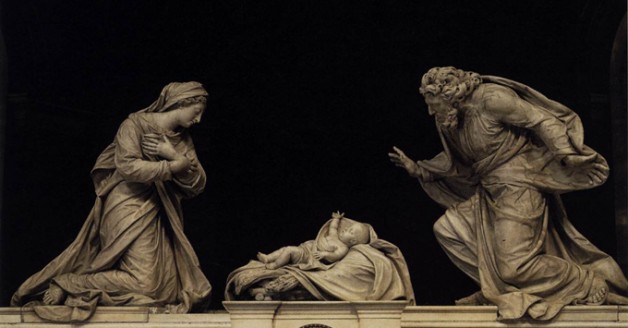In the last seven days before Christmas Eve, the Latin liturgy prescribes a new antiphon every evening at Vespers. The final “O Antiphon” for the Magnificat will be sung this evening: “O Emmanuel.” The petition which the antiphon contains is very simple and beautiful: “O Emmanuel… come to save us, O Lord, our God!” “Emmanuel” means “God-with-us.” This Messianic title contains in itself a catechism on the theology of Christmas.
St. Thomas Aquinas says that “the office of a mediator is to join together and unite those between whom he mediates: for extremes are united in the mean [medio].” Christ, in His Person, unites the divine and human. By this union He is able to mediate for us effectively.
In theology it is easy to make an error on either side by lessening either His divine or His human nature. I would like to review three of these possible errors.
Some destroy Christ’s humanity in order to emphasize His divinity. Docetism, or the doctrine that Christ’s flesh is merely apparent, is a perennial temptation for believers who wish to purchase the dignity of Christ’s divinity at the price of His humanity. That Christ could be borne in the womb of a Virgin, be a gurgling, crying, defenseless baby, or be nailed to a Cross, seems to be below the dignity of God.
The opposite temptation, that Christ must be something less than God, exists under a variety of forms. In the early Church this form of thought flourished in the doctrine of the heresiarch Arius. Arius thought that Christ’s nature must be less than the Father’s as a way to preserve the transcendence of the Father.
Another error, more common to our time, reduces Jesus to a wise, moral sage. Jesus is cast as a purveyor of a universal moral wisdom—a remarkable man with an incredible awareness of God. But at root, He is no different from us.
In the many controversies about Christ’s one divine person and his two natures (divine and human), especially those controversies precipitating the first six ecumenical councils (325-681 AD), the Church gradually made the revealed truth about Christ explicit. The Church taught that Christ united in His divine Person both his divine and human natures.
Against the errors that lessen our Lord’s divinity, we confess Christ to be “consubstantial with the Father.” Christ has the power to heal us and lead us back to communion with God the Father because he is truly God from God. Begotten before all ages, he was sent to be born of the Virgin Mary and was made like us in all things but sin. He who is one divine Person, now has both divine and human natures. He is very God and very man.
On Christmas day we celebrate the Nativity of Jesus Christ. He is the One Who, by nature and birth, is truly Emmanuel. In His own flesh He unites God and man in the closest and most intimate union. In the mystery of Christmas the salvation of mankind has already begun through Christ’s perfect humanity. Christ as “God-with-us” makes it possible for us to enter into perfect communion with the most Holy Trinity.
On behalf of Dominicana and the studentate of the Province of St. Joseph, we would like to wish you a merry and blessed Christmas.
Image: Michel Anguier, Nativity







